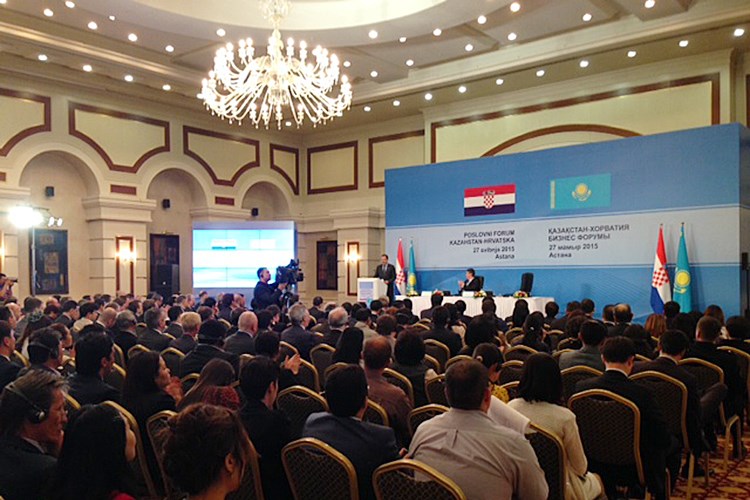- Published: 27.05.2015.
PM Milanovic invites Kazakh businessmen to do business in Croatia
Prime Minister Zoran Milanovic on Wednesday invited Kazakhstan businessmen to come to Croatia to do business, saying that Croatia was open to foreign investors.
Milanovic is heading a trade delegation on the first official visit to Astana to present Croatian companies, in the food, defence, construction, medicine, IT and telecommunications, shipbuilding and tourism industries.
Speaking about Croatia's economy at a Kazakh-Croatian business forum, Milanovic highlighted Croatia's tradition in ship building. "Croatia has a centuries long tradition of living from the sea, by the sea and with the sea," he said, adding that Croatia was open to investments and mentioning the tourism industry as an example.
"Croatia is at a turning point as far as the model of economic development is concerned," said Milanovic, underscoring that it was not possible to continue depending on the construction sector and building infrastructure and motorways but rather to turn to productivity and competitiveness.
Ahead of the forum, Milanovic met with his counterpart Karim Massimov and told him that Croatia was interested in better economic cooperation with Kazakhstan.
Milanovic also met with President Nursultan Nazarbayev with whom he discussed current international issues and closer cooperation between the two countries in trade, investments and energy.
"Trade is currently low and we wish to raise it to a higher level," Milanovic said as quoted by the Kazakh news agency Kazinform. "We have been a member of the European Union two years already, which coincided with the crisis in the EU, with increasing Croatian exports and productivity we too are now ready to participate in a growing and very promising market," he added.
Croatia's Defence Minister Ante Kotromanovic, who is also in Kazakhstan, met with his counterpart Imangali Tasmagambetov and said after the meeting that Croatia's defence industry was interesting to Kazakhstan and that he hoped Croatian companies would find opportunities to do business in that country.
Kotromanovic proposed that a joint commission be set up for defence-technical cooperation to facilitate coordination between those involved in the defence industry in both countries and state institutions.
The Croatian Chamber of Commerce (HGK), represented by President Luka Burilovic, and Rakhim Oshakbayev, First Deputy Chairman of the Board of the National Chamber of Economy of the Republic of Kazakhstan, signed an agreement to establish a Business Council between the two chambers, HGK said.
"The Croatian Chamber of Commerce recognises the great potential of Kazakhstan's economy and opportunities to develop business activities for Croatian companies in that fast-growing market. Over the past four months, we've had a series of meetings and presented Croatian companies to the Kazakhstan Embassy with their production lines and business interests in that country. Consequently, we've concluded that Croatia has something to offer to Kazakhstan and vice versa," Burilovic said.
Trade between the two countries in 2014 totalled USD 91.4 million, of which USD 22.6 million were Croatian exports and imports amounted to USD 68.7 million.
Prime Minister Massimov presented sectors in which Kazakhstan expects cooperation with Croatian companies, notably shipbuilding, defence, IT, construction and food.
"Kazakhstan is open for business. Kazakhstan is the best country in Asia for doing business. We have built a strong platform for growth. The growth of the economy of Kazakhstan has been doubled over the recent years," Massimov said.
At the end of the forum, a memorandum of cooperation was signed between Kazakhstan's investment agency KasnexInvest and several Croatian companies expressing their interest in doing business in Kazakhstan.
Kazkhstan has USD 25 billion at its disposal for investments to industrialise the country. Foreign companies wishing to invest in the country are offered several reliefs when doing business, for example, a law which protects investments and secures a 40% return on investments within three years, HGK said.
(Text: Hina)
